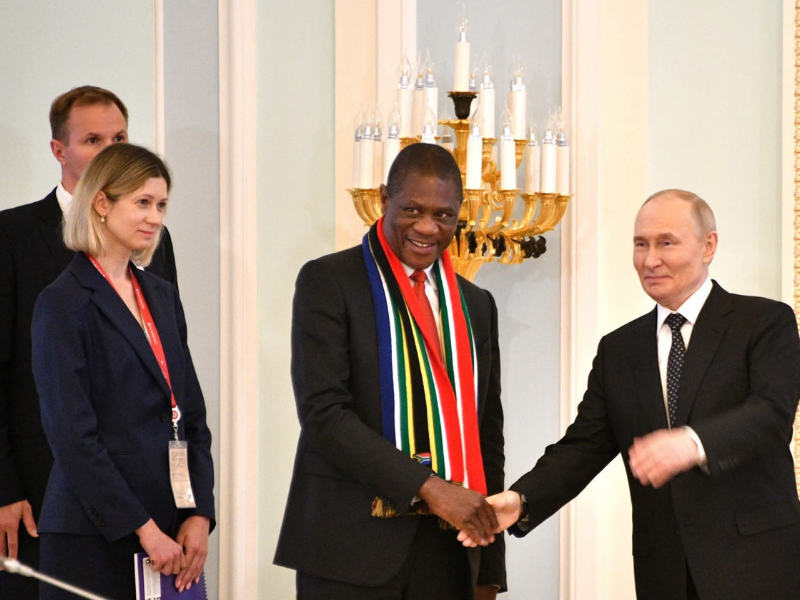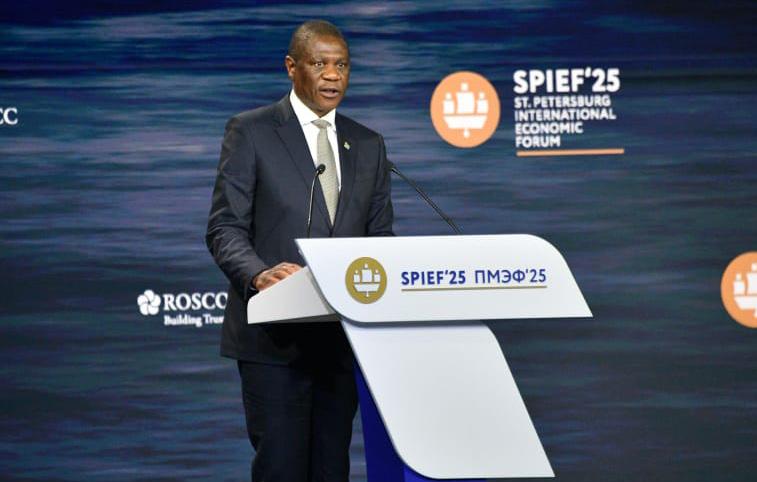
7 minute read
Deputy President Paul Mashatile's Working-visit To Russia
Deepening Economic Ties and Boosting Trade and Investment
By Shumirai Chimombe
Deputy President Paul Mashatile was in the Russian Federation from 17 June on a three-day working visit to Moscow and St Petersburg. Accompanied by a delegation of government ministers, deputy ministers and government officials, he engaged in a number of activities aimed at strengthening the bilateral trade and economic relations between South Africa and Russia.
In Moscow, the Deputy President met His Excellency Prime Minister Mikhail Mishustin at the House of the Government of the Russian Federation to discuss opportunities for bilateral political and economic cooperation between South Africa and Russia. The point of discussion included unlocking areas of further cooperation in trade and investment, mineral and energy, agriculture, health and education.
In St. Petersburg, he paid a courtesy call on President Vladimir Putin at the Constantine Palace followed by a bilateral meeting with President Putin and his Russian delegation that included the Foreign Minister Sergey Lavrov. President Putin affirmed that Russia and South Africa share solidarity when it comes to the international agenda items.
“Overall, strengthening ties with African nations remains one of our key priorities. As you know, following the second Russia-Africa Summit held here in St Petersburg in 2023, a substantial package of joint documents was adopted, including a policy declaration and an action plan through to 2026. Russia, South Africa, and other African partners are working collaboratively to implement these plans in practice.”
Creating Business Connections and Partnerships
A key part of the working visit was attending the 28th St Petersburg International Economic Forum (SPIEF 2025) which took place from 18 to 21 June. With the theme ‘Shared Values as a Foundation for Growth in a Multipolar World’ the event drew some 20 000 delegates from over 140 countries according to Africa News. Among them were government representatives, entrepreneurs, investors, as well as institutions committed to restructuring the international trade and financial systems. Key themes that dominated the forum included the expanded role of BRICS, development of new trade corridors, restructuring of energy markets, and increased cooperation with the Global South, particularly in Latin America, Africa, Southeast Asia, and the Middle East.
In his remarks at the SPIEF plenary session following President Putin’s address, Deputy President Mashatile said that “through strengthening multipolarity we are able to harness the collective power of our nations to construct a future that is more sustainable for future generations.”
“As we look to the future, the importance of the Global South in shaping international economic governance is undeniable. Africa, in particular, is fast becoming a centre of global growth. With a population projected to exceed 2.5 billion by 2050, a rising middle class, and a youthful demographic dividend, the continent has the potential to drive the next wave of industrialisation, digital transformation, and sustainable development. Africa is not in search of handouts; rather, it is pursuing equitable partnerships. It seeks equitable access to markets, capital, knowledge, and technology. This is where global platforms like SPIEF become crucial.”
He indicated that South Africa is prepared to do its share in promoting international cooperation and collaboration for the future of all nations. The future is not being written in boardrooms in the Global North alone. It is being written in the towns of East Africa, in the innovation corridors of South East Asia, in the minds and digital labs of Latin America, and the energy, agriculture and science sectors of Eurasia. “The St Petersburg International Economic Forum is one of the few remaining global platforms where this future can be shaped in dialogue. Let us then seize the moment. Let us invest in partnerships that are equitable and mutually beneficial.”
The Deputy President also addressed the South African Trade and Investment Seminar which took place at SPIEF 2025. The seminar was attended by Russian and South African business and government leaders for discussions under the theme Russia-South Africa: Business and Investment Cooperation. The event aimed at expanding opportunities for business between the two countries.
Leveraging Key Sectors For Investment and Development
Speaking to BRICS Africa Channel TV on the sidelines of SPIEF, Deputy President Paul Mashatile expressed his optimism about growing trade between South Africa and Russia. “I’ve seen that there’s a great opportunity for South Africa to benefit from the cooperation with Russia. We intend to increase our trade between Russia and South Africa as we believe it is currently a bit low at about $1-billion. We think it should increase three times. Therefore we have brought about 20 South African companies with us here to interact with their Russian counterparts. To start doing deals, to make sure they can do projects together between our two countries.”
He outlined the key areas of cooperation that South Africa had identified,
Energy: in various forms such as wind, solar and nuclear. South Africa has included nuclear energy in its energy mix. Therefore cooperation with Russia will help in that regard.
Critical minerals: South Africa has an abundance of minerals and using Russia’s technologies would assist the country to benefeciate its own minerals.
Agriculture: South Africa is increasing its exports of agricultural products to Russia, particularly citrus fruits and wines, and also importing some products from Russia such as poultry.
Digital technology: there is great potential for South Africa to benefit from innovation and knowledge exchanges.
The Deputy President further shared that some business deals had already been signed at the event. These included a South African company that had signed a deal to import Russian vodka and another one had a deal to import chicken from Russia.
“We are happy that we have agreed that we are going to strengthen cooperation. We’re going to ensure that we look at how to use Russian expertise and technology to help advance our own economy.”
A fruitful endeavour and bolstering bilateral ties for the future
Giving his feedback to the The Official YouTube Channel of the Government of South Africa, the Deputy President said that the working visit had been very successful.
“We had an opportunity to attend the St Petersburg International Economic Forum - a very important platform particularly for countries of the Global South to share ideas, to discuss collaborations, investments in our different economies, and this forum has been growing over the years. We had an opportunity where our ministers and deputy ministers were able to meet with their counterparts. In Moscow the Prime Minister had about eight ministers in the meeting. When we met with President Putin he had about 10 ministers on his side. So this was a very successful working visit where we were able to discuss the issues of energy, minerals, agriculture, and infrastructure.”
“We have a long history with Russia; we have had this relationship from the time of the Soviet Union where many of our leaders were educated and trained here in Russia. So we regard President Putin and the people of Russia as our friends and allies and we believe working with them will ensure that we succeed in our development agenda.”
The delegation that accompanied Deputy President Mashatile included:
International Relations and Cooperation Deputy Minister Alvin Botes
Water and Sanitation Minister Pemmy Majodina
Trade, Industry and Competition Minister Parks Tau
Agriculture Deputy Minister Nokuzola Capa
Public Works and Infrastructure Deputy Minister Sihle Zikalala
Mineral and Petroleum Resources Deputy Minister Phumzile Mgcina
Sport, Arts and Culture Deputy Minister Peace Mabe

Source: Government of South Africa | BRICS Africa Channel | Africa News

